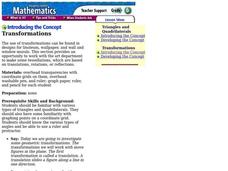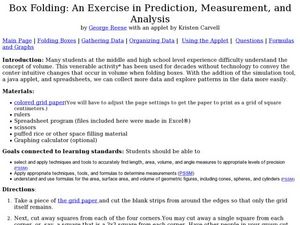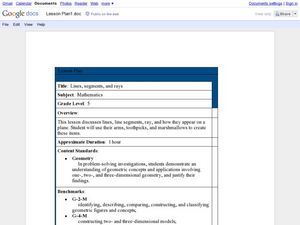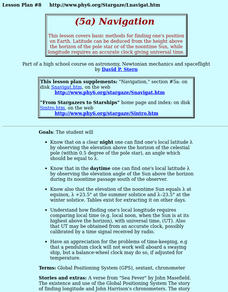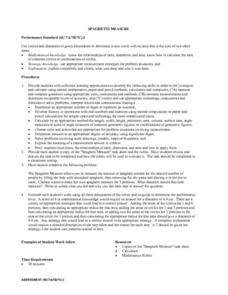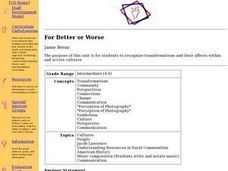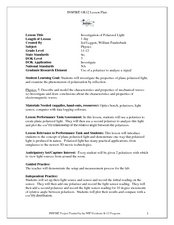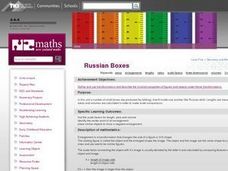Curated OER
Structures and Shapes
Students make jewelry using different shapes from magazines, tissue paper, cardboard, and other materials. In this making jewelry lesson plan, students complete this hands on activity to discuss how shapes are used.
Curated OER
Similarity and Congruence
Students explore the concept of similarity and congruence. In this similarity and congruence lesson, students identify and verify whether or not two figures are similar, congruent, or neither. Students use postulates and theorems such as...
Curated OER
Transformations
Students draw on graph paper. In this geometry lesson, students review types of triangles and quadrilaterals. Students investigate geometric transformations, including translation, rotation and reflection. Students practice each...
Curated OER
Math is Everywhere: Part 2
Second graders identify shapes and measurements in everyday life. In this measurement lesson, 2nd graders locate rectangles in their classroom and use standard and nonstandard forms to measure them. Students view a video clip...
Curated OER
Mandalas : polygons
Fourth graders create mandalas. For this mandala lesson, 4th graders look at these polygons in nature and man-made forms. They create their own by using tangrams.
Curated OER
Box Folding: Predict, Analyze and Measure
Students predict the shape of a geometric figure in 3D. In this geometry lesson, students construct 3D shapes to perfect their knowledge of measuring and predicting. This assignment is also available as an online interactive lesson.
Curated OER
Sea State
Students explain the process of wave formation and analyze the relationship between the ocean and the atmosphere. In this oceans lesson students use buoys to cast real time sea state conditions.
Curated OER
Lines, Segments, and Rays
Fifth graders use their arm, toothpicks, and marshmallows to create lines, segments, and rays. In this lines, segments, and rays lesson plan, 5th graders learn how these appear on a plane.
Curated OER
Areas of Polygons
Pupils calculate the are of regular polygons. For this geometry lesson, students create polygons on the computer and move it around to create different shapes. They explore the area of different polygons and how they inter-relate.
Curated OER
Parallel-o-Home
High schoolers investigate the usage of parallel and perpendicular shapes in the real world. In this geometry lesson, students investigate shapes for properties that are related to the real world. They relate all the properties of shape...
Curated OER
How Does Flowing Water Shape a Planet's Surface?
Students investigate how flowing water influence landforms. In this earth science lesson, students observe water behavior as it flows from the stream table at various inclinations. They discuss whether water shaped Mars landforms or not.
Curated OER
Water Quality Monitoring
Learners comprehend the four parameters of water quality. They perform tests for salinity, dissolved oxygen, pH and clarity or turbidity. Students comprehend why scientists and environmental managers monitor water uality and aquatic...
Curated OER
PROJECTILE MOTION
Students measure muzzle velocity, and predict range of a projectile device. In this motion lesson students complete a lab and explain the outcomes of their experiments.
Curated OER
Math: Equal Area Triangles
Students examine a math worksheet and determine how to divide a single triangle into four of equal area. Using geometric principles, they sketch two additional ways to divide into into four equal triangles. To conclude, students...
Curated OER
Worms and more
Students have early length experiences must develop an awareness of what length is, and of the range of words that can be used to discuss length. Young children usually begin by describing the size of objects as big and small. They...
Curated OER
Navigation
Students study the basic methods for finding one's position on Earth. Latitude can be deduced from the height above the horizon of the pole star or of the noontime Sun, while longitude requires an accurate clock giving universal time.
Curated OER
Exploring Special Segments in Triangles
Students discover that four special segments have a common intersection point. They identify the position of the intersection point in triangles. They produce conjectures about areas of the divided triangles.
Curated OER
Spaghetti Measure
Students receive a copy of a "Spaghetti Measure" task sheet along with the scoring rubric. Students preview the task and the rubric prior to starting the task. tudeThey determine the circumference of a circle of spaghetti that will...
Curated OER
Zooming In!
Pupils observe an area of the schoolground, choosing a particular viewpoint or line of vision. At various times, students take photographs and videos of the observed area. Pupils write a news article based upon their observations.
Curated OER
For Better or Worse: Cultural Exchange
Learners participate in a cultural exchange program with a Native American school in Winnebago, Nebraska. They conduct research on a variety of Native American tribes, prepare a presentation that represents the culture of their school...
Curated OER
Investigation of Polarized Light
Students investigate how polorizers filter light. In this physics instructional activity, students record their data and plot their results using a computer logging software. They discuss practical applications of polarization.
Curated OER
How Cool Is Your Environment?
Students study the formulas for calculating heat energy and how to convert Celsius to Fahrenheit. They apply the formulas on a worksheet.
Curated OER
Anne Frank: Everything Changed for Us
Students write about a time they were made to feel different, and when they were on the other side of the equation. They read other first hand accounts of times in history when people were made to feel like outsiders.
Curated OER
Russian Boxes
Sixth graders find the scale factors for length, area and volume. They identify the center point of an enlargement and place similar objects to show a negative enlargement. They report the results of an exploration of scale factors in a...




